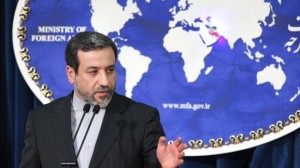 TEHRAN (FNA)- Iranian Foreign Ministry Spokesman Seyed Abbas Araqchi said Britain should take the first step to resume its bilateral relations with Tehran by changing its behavior and approach.
TEHRAN (FNA)- Iranian Foreign Ministry Spokesman Seyed Abbas Araqchi said Britain should take the first step to resume its bilateral relations with Tehran by changing its behavior and approach."It was the British who cut their relations (with Iran), therefore, if they want to resume the ties again, they should take the first step," Araqchi told FNA on Monday.
"Taking the first step requires a change in their approach and behavior in a way that the Iranian government comes to this conclusion that Tehran will benefit from reviving the resumption of relations (with London)," he added.
Araqchi referred to British Foreign Secretary William Hague's recent phone call to his Iranian counterpart Ali Akbar Salehi, and former British Foreign Secretary Jack Straw's remarks who had voiced interest in visiting Tehran, and said, "If he wants to take a step for the resumption of ties, he should start from London and try to change the approaches in his country."
Relations between Iran and Britain hit an all-time low in November 2011, when the two countries shut down their diplomatic missions around Britain's key role in the imposition of a new set of western sanctions against Iran and its repeated meddling with Iran's domestic affairs.
Iran recalled all its staff and closed its embassy in London in November after Britain recalled its diplomatic mission in Tehran due to massive protests in front of the British embassy complex by thousands of Iranian students who demanded a cut of ties with London.
The Iranian students' November protests at the British mission came after the Iranian legislators in an open session of the parliament in November approved the bill of a law on downgrading relations with Britain. After the parliament approval, Iran expelled the British ambassador from Tehran.
The parliament approval came a week after the US and Britain targeted Iranian financial sectors with new punitive measures, including sanctions on Iran's Central Bank and petrochemical industry.
The sanction against CBI and Iran's petrochemical industry was adopted in a unilateral move by the US, Canada and Britain outside the UN Security Council as other council members, specially Russia and China, had earlier warned against any fresh punitive measure, including sanctions, against Iran.
The British government has also embarked on delisting the anti-Iran terrorist Mojahedin-e Khalq Organization (MKO) from its list of terrorist groups.
The Iranian lawmakers initially started drafting a bill to downgrade ties with London after Britain's direct involvement in stirring post-election unrests in Iran in 2009, but they intensified and accelerated the move after former British Envoy to Tehran Simon Gass criticized the human rights situation in Iran.
"Today, International Human Rights Day is highlighting the cases of those people around the world who stand up for the rights of others - the lawyers, journalists and NGO workers who place themselves at risk to defend their countrymen," Gass said in a memo published by the British Embassy in Tehran on December 9, 2010.
"Nowhere are they under greater threat than in Iran. Since last year human rights defenders have been harassed and imprisoned," Gass added.
Following Britain's support for a group of wild demonstrators who disrespected Islamic sanctities and damaged private and public amenities and properties in Tehran on
December 27, 2009, members of the parliament's National Security and Foreign Policy Commission drafted bill of a law requiring the country's Foreign Ministry to cut relations with Britain completely.
The British government's blatant stance and repeated remarks in support of the last year unrests inside Iran and London's espionage operations and financial and media support for the opposition groups are among the reasons mentioned in the bill for cutting ties with Britain.
Iran has repeatedly accused the West of stoking post-election unrests, singling out Britain and the US for meddling. Tehran expelled two British diplomats and arrested a number of local staffs of the British embassy in Tehran after documents and evidence substantiated London's interfering role in stirring post-election riots in Iran.
By Fars News Agency
The Iran Project is not responsible for the content of quoted articles.










